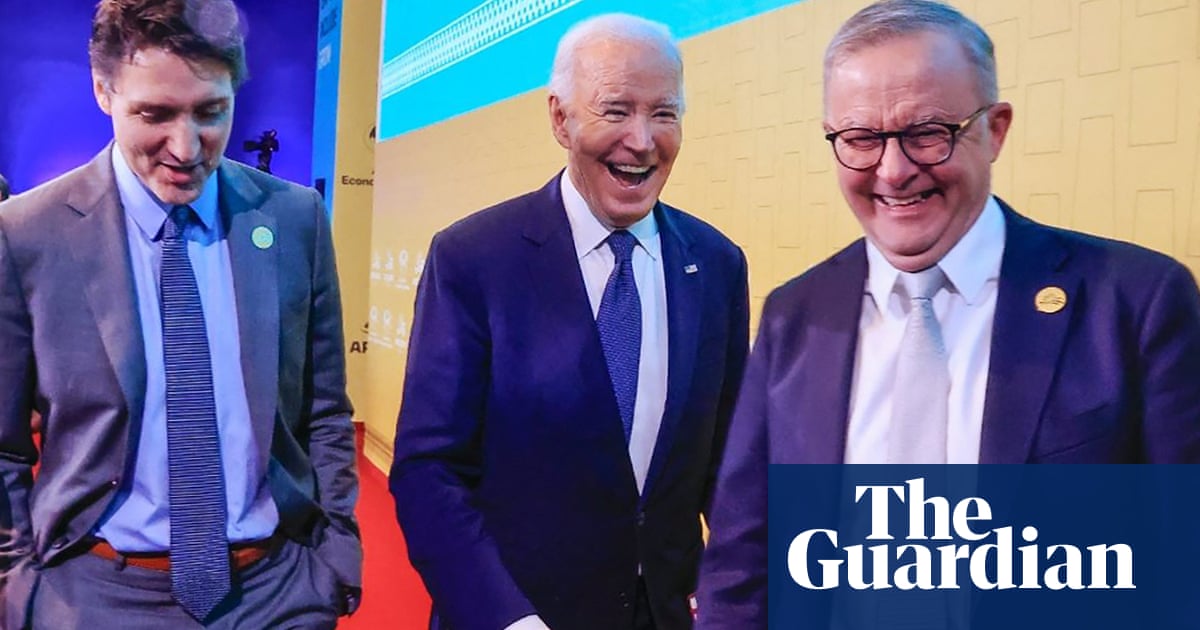The prime minister, Anthony Albanese, has hailed “inclusive trade and investment” at a major Asia-Pacific economic forum in Peru where leaders are attempting to push against the protectionist policies favoured by US president-elect Donald Trump.
Speaking at the annual Asia-Pacific Economic Cooperation (Apec) leaders summit, which assembles 21 of the world’s largest economies, Albanese told a press conference that Apec leaders consistently “spoke about the importance of free and fair trade between our economies to lift up the living standards of people throughout this region”.
Albanese met the Indonesian president, Prabowo Subianto, and Peruvian president, Dina Boluarte, on the sidelines of the summit in Lima as he attempted to promote and bolster Australia’s trade interests ahead of Trump’s return.
Albanese also said he had a “friendly” private discussion with the US president, Joe Biden, at the meeting who he said was “in good form”, while Albanese confirmed he did not speak to China’s president, Xi Jinping.
“I met with the Apec Business Advisory Council representatives, speaking about inclusive trade and investment, ” Albanese said.
Asked about work to lift trade tariffs with China, Albanese said: “I’m not a commentator … but what I’ve done with China is work in the way that we said we would before the election.”
“Whether it’s coal, barley, wine, other products, including seafood and others, people are in employment in Australia today because of our trade,” he said.
The Australian Institute of International Affairs’ chief executive, Bryce Wakefield, said “the election of Donald Trump has overshadowed everything” at the forum.
“[Biden] is sort of a mega lame-duck president because not only is he going out of office, but the president following him, it’s clear that his policies are going to be starkly different to Biden’s,” Wakefield said.
Trump has flagged tariffs on imports to the US of between 10 and 20%, and up to 60% on Chinese goods.
That has led nations to pivot their trade priorities, including potential shifts towards China but also among the middle nations in the region.
“You can predict a lot more coordination between mid-sized economies as they attempt to diversify their relations away from the United States during such a fraught period,” Wakefield said.
Despite that, Australian trade might benefit should the incoming president scrap his predecessor’s Inflation Reduction Act, which encourages green energy investment in the US.
after newsletter promotion
“A lot of that investment may now be redirected towards countries with resources that are crucial to the green economy, and Australia is one of those countries with important resources like lithium that are used in batteries.”
Australia would be pushing to liberalise trade through measures such as digitising trade documents to increase efficiency, promoting its green agricultural products and building on trade cooperation, former trade minister and Australian Apec Study Centre director Craig Emerson said.
“We are great champions of free and open trade, and it gives Australia an opportunity to reaffirm that,” he said.
Meanwhile, Australia’s acting prime minister and minister for defence, Richard Marles, will host Japan’s minister of defence, Gen Nakatani, and US secretary of defence, Lloyd Austin, for the 14th trilateral defence ministers’ meeting on Sunday in Darwin.
The ministers and secretary will discuss cooperation through exercises and operations, shared strategic capabilities, science and technology and defence industry cooperation.
““I am honoured to welcome Minister Nakatani and Secretary Austin … I look forward to discussing defence cooperation with two of our closest partners,” Marles said.
